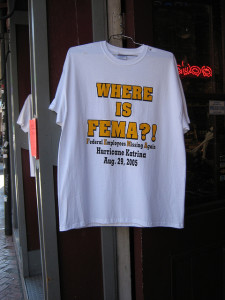
“Where Is FEMA?” t-shirt sold in New Orleans after Hurricane Katrina
(This is the third installment in a series about differences between Democratic and Republican Presidents in areas where they have direct control. See our Democratic vs. Republican Presidents category for the rest.)
In 1986, President Ronald Reagan famously said: “the nine most terrifying words in the English language are ‘I’m from the government and I’m here to help.’” Reagan’s statement epitomizes the conservative anti-government philosophy that has taken hold among Republican presidents and presidential candidates. This is a huge difference between Republicans and Democrats, and this difference is especially apparent when it comes to disaster relief.
One of the lowest points of George W. Bush‘s presidency, and indeed, of America’s history, was Bush’s incompetent, possibly criminally negligent, handling of the preparation for and aftermath of Hurricane Katrina, which made landfall in Louisiana in August 2005. But the problem started years earlier, when Bush named Michael Brown as his head of the Federal Emergency Management Agency (FEMA) that handles disasters such as hurricanes. Brown was previously the Judges and Stewards Commissioner of the International Arabian Horses Association. This choice for such an important position, and Bush’s detachment during the Katrina emergency, tragically demonstrated conservative Republican hands-off governing philosophy.
In contrast, when Hurricane (Superstorm) Sandy made landfall in New Jersey in August 2012, President Barack Obama and his FEMA were prepared. Perhaps that was because, in contrast to Bush FEMA Director Michael Brown, President Obama had chosen Craig Fugate, who was Florida’s Emergency Management Director, as the new FEMA head. Obama’s FEMA help during Hurricane Sandy was effective enough such that New Jersey Republican Governor Chris Christie happily welcomed President Obama and engaged in that famous “hug” with him (more like a friendly handshake and shoulder pat from Obama). However, Republicans outside of New Jersey continue to criticize Christie to this day for “hugging” President Obama, saying that the event helped Obama appear caring and competent in a crisis, which helped him win re-election just over two months later. Unfortunately, these Republicans are more concerned about ideology and winning elections than about responding to life-threatening disasters. Indeed, then-Vice Presidential candidate for the GOP and House Budget Committee Chairman Paul Ryan‘s budget would have spent only about half as much on FEMA as President Obama’s.
Going forward, scientists predict that America and the world will face more disasters, such as drought in some areas, and severe flooding and storms in others, due to climate change. Indeed, Hurricane Patricia, the strongest hurricane in history, just hit the west coast of Mexico. Just north of where Patricia landed, however, California is experiencing its worst drought in recorded history. Meanwhile, Republicans, including most of the current Republican presidential candidates, range from climate change “skeptics” to outright deniers. Combined with their anti-government philosophy, Republican presidents, therefore, can be expected to (1) do little or nothing, and spend less, to prevent weather-related disasters from continuing to spiral out of control; and (2) be ill-equipped beforehand or afterward to handle them.
[Photo by Infrogmation of New Orleans, used under Creative Commons license.]
UPDATE 10/27/15: Victims of Hurricane Sandy, complaining that New Jersey Governor Chris Christie has forgotten about them, have gathered across from the state capital in Trenton to try to pitch tents and camp out to have their concerns heard. They say that Christie, after winning a large re-election majority in November 2013 in part due to his post-Sandy relief actions, has moved on now that he’s running for the GOP presidential nomination and his political benefit from Sandy is behind him.


